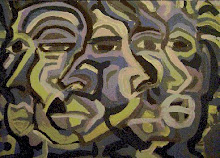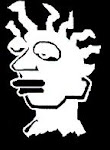 Those who see the value of I.Q. tests and the separation of children into groups based on them - may be practicing eugenics by culling the best of one group to interact (and be influenced by) the best of another group.
Those who see the value of I.Q. tests and the separation of children into groups based on them - may be practicing eugenics by culling the best of one group to interact (and be influenced by) the best of another group.The first "IQ" tests given are often the simple "Draw A Man" tests.
http://en.wikipedia.org/wiki/Draw-A-Person_Test
One's ability to notice and interpret (see and draw) details at an early age is considered by some to be an indicator of their cognitive skills and mental maturity.
 The first drawing would be considered remedial for a kindergartner but the second would be deemed to be more expressive and insightful.
The first drawing would be considered remedial for a kindergartner but the second would be deemed to be more expressive and insightful.
Is the ability to draw an early indicator of being able to thrive at M.I.T.?














5 comments:
Actually the US Army began giving what are considered the first real intelligence tests in 1917. Following that was Lewis Terman's, Stanford Benet test.
@ classical one - I actually meant the first given in one's life.
I once heard of a method of teaching where they did not teach children to read and write until they were eight. They instead had the children working with clay, paints and other forms of creative expression then at age eight began to teach the children the alphabet and to read. The Children were found as adults to have become more creatively inclined and worked in art whereas children taught to read at an early age and then given art were more inclined to lean towards fields such as Engineering. They thought very liner.
Just thought that was interesing. Who can truly judge or measure genius?
Jaycee
funny that I could easily have outdrawn that second one while a kindergartner. am i a genious? probably less that than the fact that I am a child of a high school art teacher who paid attention to his son's scribbling.
@ Mista Jatcee - You must be in Cali. .
I was in a lot of "inventive" teaching classes (there) when I was a kid.
@ brohammas - Maybe you were taught to notice what others might overlook. People who are able to do this and translate it back to a wider audience are often thought to be "geniouses".
Post a Comment